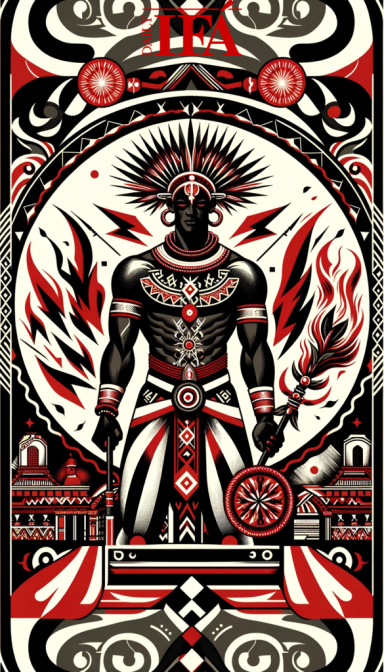
About ORISHÀ SHANGO
Shango, also known as Sango or Xango, is a prominent orisha in the Yoruba religion and its diasporic forms, including Candomblé and Santería. He is closely associated with thunder, lightning, fire, and justice, and is revered as a dynamic deity embodying strength, passion, and leadership. Shango's influence on a person's life can be profound, as he plays various roles that touch upon different aspects of human experience.
Shango's influence in a person's life is multifaceted, touching upon aspects of strength, protection, justice, creativity, leadership, and communal harmony. He is a figure of great power and complexity, whose presence can be profoundly transformative.
About the ORISHÁ
Roles and
Influence
- God of Thunder and Lightning: Shango wields thunderbolts and is connected to the powerful forces of nature, symbolizing natural power and energy.
- Symbol of Power and Strength: Embodying strength, courage, and masculinity, Shango is a figure of assertiveness and physical prowess.
- Protector against Evil Spirits and Witchcraft: He offers protection against negative energies and harmful spiritual practices.
- God of Justice and Divine Judgment: Shango ensures fairness and justice, punishing wrongdoers and maintaining moral balance.
- Patron of Kings and Leaders: As a leader, he inspires decisiveness and charisma, making him a role model for those in authority.
- God of Dance and Celebration: Associated with lively rituals, Shango is a symbol of joy and communal celebration.
- Provider of Wealth and Prosperity: He is seen as a benefactor of financial success and material well-being.
- Giver of Inspiration and Creativity: Shango fuels artistic expression, inspiring passion and vitality in the arts.
- Guardian of Ancestors: He maintains the connection between generations and ensures the well-being of ancestral spirits.
- Symbol of Resilience and Perseverance: Representing the ability to overcome challenges, Shango is a source of strength in difficult times.
Characteristics and Symbolism
- Symbols: Double Axe (Oxé), Meteorites, Pestle, Xerê (Rattle).
- Colors: Red and white, signifying life and fire and his devotion to Oshalá.
- Natural Places: Quarry, indicating his connection to the earth and raw materials.
- Flowers and Essences: Red and White Carnations, Clove.
- Stones: Ruby, Jasper, Pyrite, Meteorite.
- Metal: Copper, Gold, Lead, Tin.
- Health: Liver and Gallbladder.
- Planet and Weekday: Jupiter, Wednesday.
- Element: Fire (Large Flames, Lightning), Rock Formations.
- Chakra: Heart Chakra.
- Greeting: Kawóo Kábíyésilé.
- Animals/Offerings: Sheep, Turtle, Snake, Duck, Rooster, Guinea Fowl.
- Plants: Orchid, Rama-de-Leite, Ocimum basilicum, Taro, etc.
- Offerings: Amalá, Okra with Dried Shrimp, Ajabo Angelfish, etc.
- Drinks and Foods: Aruá, White Wine, Amalá.
- Number: 12.
- Commemoration Day: June 29th.
- Domains: State Power, Justice, Legal Matters.
- Syncretism: Joseph of Nazareth, Saint Anthony, Simon Peter, Moses, etc.
Key Manifestations (Aspects)
Shango manifests in various forms, including
- Obá Afonjá - Afonjá, the Balé (Regent) of the city of Ilorin. Afonjá was also Are-Ona-Kaka-n-fo, the leader of the empire's army. Associated Orishás: Oyá Petu and Yemanjá.
- Obá Aganjù - Aganjú represents everything explosive and uncontrollable; he personifies the volcano. Aganjú is also an Orixá belonging to Shangô's group and is highly revered and respected. According to the Itans, the verses of Ifá, he is the nephew and son of Dadá Ajaká. Aganjú is a hot-blooded, tumultuous, and angry deity. He personifies the eruption of the volcano and rules within its crater. He represents the heat that rises from the depths of the earth with great destructive power but also grants life. Associated Orishás: Yemanjá.
- Agodô - Shangô is an extremely warlike and battle-loving figure. He wears wormwood or brown and carries two Oshês (double-headed axes). Associated Orishás: Yemanjá.
- Obá Ajakà - Also known as Bayaniym, which means "My father has chosen me," referring to the fact that he was the eldest son of Oranyan and as Shangô' older brother, he had the right to ascend the throne. However, he is still seen as an aspect or quality of Shangô.
- Alafim - Shangô is associated with political and organizational power and possesses an ancient and majestic character. Associated Orishás: Oshaguiã.
- Alufan - Quality of Shang with very ancient characteristics, often confused with Ayrá or even Oshalufã himself. He wears white, and his tools are silver. Associated Orishás: Oshalufã.
- Ashabó - A very rare female quality of Shangô, whose cult is almost extinct. Associated Orishás: Yemanjá and Oshum.
- Ayrá - An older aspect of Xangô closely related to the Funfun pantheon and has its own subdivisions. Usually wears white and uses Segui instead of coral beads.
- Obá Irù or Barù - The title given to Shangô when he reaches the peak of his kingdom: when he creates the Egungun cult, he becomes the human form of the primordial Orixá Jakutá on Earth, the Lord of Lightning, Thunder, the Sun, and Fire in all its forms. Associated Orishás: Eshu.
- Obá Jakutá - Jakutá represents justice and the wrath of Olorun. According to the myth, Shangô was introduced to this Orishá, considered his divine original form. He was sent in his divine form by Olorun to restore order and submit to the plans of creation during a time of dispute between the gods Odudua and Oshalá. Associated Orishás: Oyá and Shangô Afonjá.
- Obá Kosso - The title given to Xangô when he founds and becomes the king of the city of Kossô near Oyo. This title was also given to Aganju, the twin brother of Xangô, when he arrived in Oyo and was welcomed with "the king did not hang himself."
- Obain - A quality associated with Oyá. He wears brown. Associated Orishás: Oyá.
- Obá Lubê, Obalubé - Shangô's title that refers to his power and wealth; it can be translated as "Rich Lord." He is the Shangô most associated with Obá and marriage. Associated Orishás: Obá, Oyá, and Oshum.
- Oranfé - Shangô is associated with justice and the strict fulfillment of the law. It is Shangô's most blessed quality.
- Obá Orungã - Orungan is the son of Aganju Solá and Yemanjá. He is the Lord of the atmosphere, the air we breathe, and the protective layer that shields the Earth.
Sign-Up for free to your Weekly Newsletter.
Illustrations of the Orishá
Wir benötigen Ihre Zustimmung zum Laden der Übersetzungen
Wir nutzen einen Drittanbieter-Service, um den Inhalt der Website zu übersetzen, der möglicherweise Daten über Ihre Aktivitäten sammelt. Bitte überprüfen Sie die Details in der Datenschutzerklärung und akzeptieren Sie den Dienst, um die Übersetzungen zu sehen.




